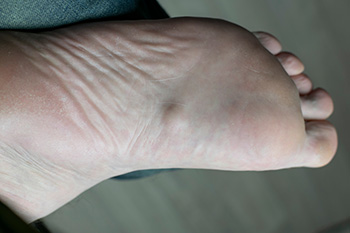BLOG

Foot problems in the elderly are often worsened by aging-related changes and chronic conditions. Poor circulation is a common issue, reducing blood flow to the feet and causing symptoms like coldness, swelling, and slow-healing wounds. Arthritis, especially osteoarthritis, can lead to painful joint stiffness and deformities in the feet, making it difficult to walk or stand for long periods. Decreased pain sensation, often due to nerve damage, means that injuries or infections may go unnoticed, increasing the risk of complications. Diabetes is another significant risk factor, as it can lead to neuropathy, poor circulation, and an increased likelihood of developing ulcers or infections. If you are elderly and have noticed any changes to your feet, it is suggested that you confer with a podiatrist who can find effective relief and treatment solutions.
If you need your feet checked, contact one of our podiatrists of Livingston Foot Care Specialists. Our doctors will attend to all of your foot and ankle needs and provide you with quality treatment.
Geriatrics and Podiatry
When people age, some common issues that may occur are bone density loss, dry skin, poor circulation, and rough brittle nails. These issues may also affect your foot health if the necessary steps are not taken to alleviate the problems.
It is important to take care of your feet because feet that are injured or diseased can affect your overall health. Having painful feet hinders your ability to do daily activities or may decrease your willingness to do the things that you need to do.
Visiting Your Geriatrician
As we age, health problems become more likely, so it is essential to visit your doctor for check-ups to ensure that you are doing the best you can to take care of your health. It is recommended to check your feet frequently for any possible cuts, bruises, swelling, corns or any other irregularities.
Taking Care of Elderly Feet
Cracked or dry feet can be treated by applying moisturizer often. It is also important not to wear old socks because the older the sock is, the higher the possibility there will be that there is bacteria there. Wear fresh socks and make sure they fit properly.
Proper foot health means that you can have a more active lifestyle and you will not be bogged down by pain. Foot health also leads to good circulation, which is paramount for overall health.
If you have any questions, please feel free to contact our office located in North Bellmore, NY . We offer the newest diagnostic tools and technology to treat your foot and ankle needs.

A broken foot refers to a fracture in one or more of the bones in the foot, which may result from trauma, overuse, or sudden stress. Common causes include falls, car accidents, sports injuries, or dropping heavy objects on the foot. Stress fractures may develop gradually from repetitive activity, especially in athletes or individuals with high-impact routines. A broken foot typically causes pain, swelling, bruising, and difficulty bearing weight. Diagnosis begins with a physical examination, during which a podiatrist assesses the area for tenderness, deformity, or limited motion. X-rays and other imaging tests are used to confirm the presence and extent of the fracture. In some cases, advanced imaging like a CT or MRI scan may be required. If you have reason to believe you have fractured your foot, it is suggested that you promptly consult a podiatrist who can provide treatment.
A broken foot requires immediate medical attention and treatment. If you need your feet checked, contact one of our podiatrists from Livingston Foot Care Specialists. Our doctors can provide the care you need to keep you pain-free and on your feet.
Broken Foot Causes, Symptoms, and Treatment
A broken foot is caused by one of the bones in the foot typically breaking when bended, crushed, or stretched beyond its natural capabilities. Usually the location of the fracture indicates how the break occurred, whether it was through an object, fall, or any other type of injury.
Common Symptoms of Broken Feet:
- Bruising
- Pain
- Redness
- Swelling
- Blue in color
- Numbness
- Cold
- Misshapen
- Cuts
- Deformities
Those that suspect they have a broken foot shoot seek urgent medical attention where a medical professional could diagnose the severity.
Treatment for broken bones varies depending on the cause, severity and location. Some will require the use of splints, casts or crutches while others could even involve surgery to repair the broken bones. Personal care includes the use of ice and keeping the foot stabilized and elevated.
If you have any questions please feel free to contact our office located in North Bellmore, NY . We offer the newest diagnostic and treatment technologies for all your foot and ankle needs.

Foot and ankle injuries in baseball often result from quick sprints, sudden stops, and sliding into bases. These movements can place excessive strain on the toes, arches, and ankles. Among the most common baseball injuries are turf toe, which is a big toe joint sprain, sesamoiditis, which is caused by inflammation of bones under the big toe, and ankle sprains, which result from overstretching ligaments. Cleats that do not fit properly may cause blisters, toenail injuries, or pressure on nerves that run across the top of the foot. Younger players may be affected by heel pain, known as Sever’s disease, which occurs when the growth plate in the heel becomes irritated from overuse. Midfoot injuries, which involve damage to the bones and ligaments in the arch, may need advanced imaging to confirm and sometimes require surgery. A podiatrist can perform a detailed examination, order necessary imaging, and provide medical treatment, including orthotics, padding, or surgery to relieve pain. If you have sustained a foot or ankle injury while playing baseball, it is suggested that you schedule an appointment with a podiatrist for an exam, diagnosis, and appropriate treatment.
Sports related foot and ankle injuries require proper treatment before players can go back to their regular routines. For more information, contact one of our podiatrists of Livingston Foot Care Specialists. Our doctors can provide the care you need to keep you pain-free and on your feet.
Sports Related Foot and Ankle Injuries
Foot and ankle injuries are a common occurrence when it comes to athletes of any sport. While many athletes dismiss the initial aches and pains, the truth is that ignoring potential foot and ankle injuries can lead to serious problems. As athletes continue to place pressure and strain the area further, a mild injury can turn into something as serious as a rupture and may lead to a permanent disability. There are many factors that contribute to sports related foot and ankle injuries, which include failure to warm up properly, not providing support or wearing bad footwear. Common injuries and conditions athletes face, including:
- Plantar Fasciitis
- Plantar Fasciosis
- Achilles Tendinitis
- Achilles Tendon Rupture
- Ankle Sprains
Sports related injuries are commonly treated using the RICE method. This includes rest, applying ice to the injured area, compression and elevating the ankle. More serious sprains and injuries may require surgery, which could include arthroscopic and reconstructive surgery. Rehabilitation and therapy may also be required in order to get any recovering athlete to become fully functional again. Any unusual aches and pains an athlete sustains must be evaluated by a licensed, reputable medical professional.
If you have any questions please feel free to contact our office located in North Bellmore, NY . We offer the newest diagnostic and treatment technologies for all your foot and ankle needs.

A plantar fibroma is a benign growth that forms within the plantar fascia, a thick band of tissue along the bottom of the foot. This firm lump is usually located in the arch and may gradually increase in size. While it is noncancerous, a plantar fibroma can cause discomfort, especially while walking or standing for extended periods. Symptoms often include a noticeable lump, aching pain, or a sensation of pressure when wearing shoes. The exact cause of plantar fibromas is not fully understood, but factors such as genetic predisposition, trauma to the foot, or underlying medical conditions may contribute. Early identification and appropriate care can help manage uncomfortable symptoms. If you have a lump on the sole of your foot, it is suggested that you confer with a podiatrist who can offer you relief and management tips.
A plantar fibroma may disrupt your daily activities. If you have any concerns, contact one of our podiatrists of Livingston Foot Care Specialists. Our doctors can provide the care you need to keep you pain-free and on your feet.
Plantar Fibroma
A plantar fibroma is a fibrous knot in the arch of the foot. It is embedded in the plantar fascia which is a band of tissue that extends from the heel to the toes along the bottom of the foot. There can be multiple plantar fibromas in the feet at the same time. There are no known causes for this condition. If you have a plantar fibroma, there will be a bump in the arch of your foot that cannot be missed. Any associated pain is most often due to a shoe rubbing against the nodule. Non-surgical options, such as steroid injections, physical therapy, and orthotics should be tried first. Surgery is a last resort and is the only thing that will remove a plantar fibroma entirely. Consult with a podiatrist for a proper diagnosis and to determine the treatment regimen that is right for you.
What Causes a Plantar Fibroma?
While there are no specific causes identified, a plantar fibroma can possibly come from genetic predisposition or the formation of scar tissue that forms from healing the tears in the plantar fascia.
What Are the Symptoms of a Plantar Fibroma?
There will be a noticeable lump in the arch of the foot that may or may not cause pain. If pain is felt, it is typically because a shoe is rubbing up against the lump or when walking or standing barefoot.
Treatment and Prevention
A plantar fibroma will not disappear without treatment, but it can get smaller and be a non-issue. If pain persists, a podiatrist examines the foot and when the arch of the foot is pressed, pain can be felt down to the toes. An MRI or biopsy might be performed to help diagnose or evaluate the plantar fibroma. The following non-surgical options are generally enough to reduce the size and pain of these nodules:
- Steroid injections
- Orthotics
- Physical therapy to help apply anti-inflammatory creams on the bump
Surgery is considered if the mass increases in size and the patient continues to feel pain after non-surgical methods are tried.
If you have any questions please feel free to contact our office located in North Bellmore, NY . We offer the newest diagnostic tools and technology to treat your foot and ankle needs.